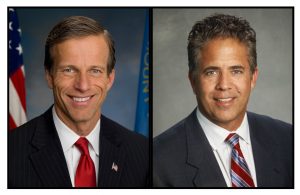
As sovereign governments, states are generally free to set their own tax policies. However, it is important that they do so in a way that does not place a substantial burden on interstate commerce. As the American workforce becomes increasingly mobile, Congress has a constitutional duty to ensure that state income tax policies do not interfere with interstate economic activity.
Currently, more than 40 states impose a personal income tax on income earned within their borders, regardless of the earner’s state of residency. In each of those states, not only is a non-resident employee required to pay tax after carrying out work for a certain period of time or earning wages in the state, but his or her employer must also withhold that state’s income tax on behalf of the employee and remit it to the state at the end of the tax year. The question then is whether compliance with various state income tax and withholding laws places a substantial burden on employees who cross state lines to do their jobs? A witness recently testified at a House Judiciary Committee hearing about an egregious example of an employee at his company having to file 50 W-2s in one year. After hearing his story and others like it, we believe the answer is clearly yes.
Currently, more than 40 states impose a personal income tax on income earned within their borders, regardless of the earner’s state of residency.
Take, for example, an employee who lives and works in Michigan but travels to and from New York for 15[1] days in a year. The employer should withhold payroll taxes from both Michigan and New York proportional to the number of days worked in each state. The employee would then file two separate W-2s – one in Michigan for his or her resident income tax return, and another in New York for his or her non-resident income tax return. The State of Michigan would then give the employee a tax credit for any income tax paid to New York. Although the total dollar amount in taxes paid may be the same for the employee, there are potential penalties for failing to file or not withholding in a timely manner, not to mention the administrative expenses imposed on both the employee and the employer. This scenario is even worse for an employee who lives in a state without an income tax, such as South Dakota. Such an employee would be required to pay income tax in New York without any opportunity to have this new tax liability offset by virtue of an income tax credit in his or her home state.
In order to vastly simplify the income tax obligations for families and businesses, we have introduced legislation that will reduce the costs for America’s mobile workforce without hindering interstate commerce. The House and Senate bills – H.R. 2315 and S. 386 – comprise the bipartisan Mobile Workforce State Income Tax Simplification Act of 2015. If enacted, this legislation would provide a bright-line test for when state and local governments can subject non-residents to state and local income taxes. Specifically, the bill provides that wages paid to an employee working in multiple states would be subject both to the laws of the employee’s state of residence and the states in which the employee conducts business for more than 30 calendar days of the year.
Members of Congress and America’s workforce have seen firsthand the myriad conflicting income tax laws facing traveling workers, or our “mobile workforce.” These laws burden small businesses that often do not have the resources to adhere to dozens of state income tax regimes. Simply put, American workers should not be punished with burdensome paperwork simply because jobs in the modern economy may take them to multiple states.
A witness recently testified at a House Judiciary Committee hearing about an egregious example of an employee at his company having to file 50 W-2s in one year.
Rather than expanding their payrolls or reducing the prices of goods for consumers, businesses are being forced to re-allocate resources to comply with convoluted state income tax laws. The Constitution grants Congress the authority to enact laws that protect the free-flow of commerce between the states. While we support federalism and the ability of states to set their own policies, the problems created by allowing states to determine when they can impose income tax on residents of other states deserve a serious solution.
We live in a time when more and more Americans are finding themselves traveling for their jobs, and the tax complexities created in this new economy demand a common-sense solution. With significant bipartisan support in both the House and Senate, we remain optimistic about our legislation becoming law in the near future. Reducing an obvious administrative burden will allow employers and employees alike to focus their resources on what really matters, such as increasing payrolls and raising wages. This Congress is focused on building an economy that will empower all Americans to seek new opportunities and achieve a better life. Enacting the Mobile Workforce State Income Tax Simplification Act of 2015 is another way we can achieve that goal.
U.S. Senator John Thune (SD) is Chairman of the Senate Republican Conference, and Rep. Mike Bishop represents Michigan’s 8th Congressional District.
[1] Note that NY imposes withholding obligation on the employer if the employee works in NY for more than 14 days in the year.




